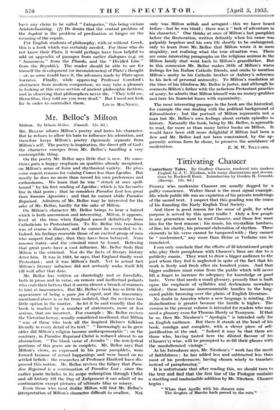Mr. Belloc's Milton
Milton. By Hilaire Belloe. (Cassell. 12s. 6d.)
Mn. BELLOC adores Milton's poetry and hates his character. But he refuses to allow his hate to influence his adoration, and therefore keeps Milton's poetry rigorously separate from Milton's self. The poetry is inspiration, the direct gift of God ; the character emerges from Mr. Belloc's handling a very contemptible thing.
On the poetry Mr. Belloc says little that is new. He some- times puts a happy emphasis on qualities already recognized, on Milton's sense of form and rhythmical variety. He gives some cogent reasons for valuing Cotnus less than Lycidas. But mostly he does no more than record his own preferences and enthusiasms. We learn that he was "struck at once spell- bound" by his first reading of Lycidas ; which is his favourite line in that poem ; that he considers Paradise Lost less great than Samson Agonistes ; and that he cannot abide Paradise Regained. Admirers of Mr. Belloc may be interested for the sake of Mr. Belloc; hardly for the sake of Milton.
On Milton's character Mr. Belloc brings to bear a hatred which is both uncommon and interesting. Milton, it appears, lived at the time when England passed definitively from Catholicism to Protestantism. To Mr. Belloc this transitiOn was of course a disaster, and he cannot be reconciled to it. Indeed, his feelings resemble those of an excited group of men who suspect foul play, that they have been betrayed. Nous sommes trahis—and the criminal must be found. Believing that great poets have a vast. influence, Mr. -Belloc finds that Milton is the criminal. Nor do the facts of literary history deter him. It was in 1688, he says, that England finally went Protestant ; and it was Milton's fault. Yet in actual fact Milton's literary influence did not seriously make itself felt till well after that date.
Mr. Belloc has written so charmingly and so forcefully, both in prose and in verse, on remote and ineffectual pedants who crab their betters that it seems almost a breach of manners to hint at inaccuracies. But Mr. Belloc's book has so little the appearance of being a pure jets d'esprit, and the inaccuracy mentioned above is so far from isolated, that the reviewer has little option in the matter. So let it be said roundly that the 'book is marked by a number of statements, more or less serious, that are incorrect. For example : Mr. Belloc revives the Victorian heresy, usually considered moribund, that Milton "was of those who took all the inspired Hebrew folklore literally in every detail of its text." "Increasingly as he grew older did Milton's religion become anthropomorphic" : on the contrary, in Paradise Regained Christ is reduced almost to an abstraction. "The blank verse of Arcades " : the non-lyrical portions of this poem are in couplets. Mr. Belloc says that Milton's views, as expressed in his prose pamphlets, were formed because of actual happenings and were based on no settled beliefs : the researches of Professor Hanford have dis- proved this notion. Mr. Belloc revives the fallacy that Para- dise Regained is a continuation of Paradise Lost : since the earlier poem includes in its seope redemption through Christ and all history till the Day of Judgement it can admit of no continuation except pictures of ultimate bliss or misery.
Even those who most dislike Milton will find Mr. Belloc's interpretation of Milton's character difficult to swallow. Not
only was Milton selfish and arrogant—this we have heard before—but he was timid ; there was a "lack of adventure in his character." One thinks at once of Milton's last pamphlet before the Restoration, written defiantly when his cause was palpably hopeless and his own life shortly to be endangered, only to learn from Mr. Belloc that Milton wrote it in mere stupidity, not realizing what the true situation was. There are some interesting paragraphs on the religious animus in the Milton family that -went back to Milton's grandfather. But in this connexion Mr. Belloc makes little of Milton's warm feelings for his Italian Catholic friends, and omits to mention Milton's amity to his Catholic brother or Aubrey's reference to his lack of personal animosity. To Milton's resolution at the time of his blindness Mr. Belloc is juster, and although he connects Milton's father with the nefarious Protestant practice of usury, he admits that Milton himself was no money-grubber and bore his financial losses with equanimity.
The most interesting passages in the book are the historical, for example the one dealing with the political background of Eikonoklastes ; but the portrait of Milton represents not a man but Mr. Belloc's own feelings about certain episodes in history. Naturally the book, being by Mr. Belloc, is agreeable to read, far more so than many better books on Milton. It would have been still more delightful if Milton had been a Jew and Mr. Belloc had not been constrained, by the ap- parently serious form he chose, to preserve the semblance of










































 Previous page
Previous page